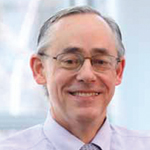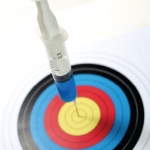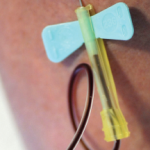
Dr. Pope
When the head of the division steps down, how do you mark that event? The Feinberg School of Medicine, Northwestern University-Chicago hosted a day-long symposium to honor Richard M. Pope, MD, who had been chief of the division for 27 years, according to Harris Perlman, PhD, the new chief of the Division of Rheumatology.
Richard M. Pope, MD, had been chief of the division for 27 years and was Dr. Perlman’s mentor. “We wanted to do more than a dinner.” On May 4, a who’s who of the academic rheumatology community gathered to speak about the research and influence of Dr. Pope. The symposium also served as a philanthropic event to help build a fellowship in Dr. Pope’s name.
Dr. Perlman organized the symposium to honor his former mentor and boss, reaching out to Dr. Pope’s collaborators and trainees. The symposium started with an overview of the basic science. The afternoon covered how rheumatology has changed and progressed during Dr. Pope’s tenure at Northwestern. Rheumatology treatments have gone from gold shots through methotrexate to biologics during the years Dr. Pope served as director of the Division of Rheumatology.
“Dr. Pope has developed an outstanding division with strong research and clinical care. He’s a good mentor and has brought along a lot of faculty for a very long time. It [was] really appropriate to honor him this way,” says Lewis Landsberg, MD, professor of medicine at Northwestern, who delivered the opening remarks.
Eric Ruderman, MD, another professor of medicine at Northwestern, agreed that the symposium was “a better way to honor Dr. Pope than a dinner. It [was] a celebration of his tenure and of the changes in rheumatology during that time. There have been changes in therapies, approaches to therapy and the overall understanding of the diseases. He’s made pretty major contributions to rheumatology through both research and training other people.”
S. Louis Bridges Jr., MD, PhD, professor of medicine at the University of Alabama, Birmingham, also spoke. “I first met Dr. Pope at a meeting. The academic rheumatology community is relatively small,” which meant they kept seeing each other at other meetings. “We became friends. I have lots of admiration for him as a scientist and as a person.”
“Dr. Pope took a good program to a great program, predicated on diversity,” says Dr. Perlman. “Many programs have diversity in research, but concentrate the clinical on one or two diseases. Dr. Pope created a program with clinical work and research around many rheumatoid diseases. Expertise in every area makes the program very different.”
‘Dr. Pope has developed an outstanding division with strong research and clinical care. He’s a good mentor and has brought along a lot of faculty for a very long time. It [was] really appropriate to honor him this way.” —Lewis Landsberg, MD
The Man
Everyone The Rheumatologist spoke with mentioned what a fine person, as well as an exemplary scientist, Dr. Pope is. Dr. Ruderman told a story about being recruited to Northwestern by Dr. Pope. “In making my decision, I consulted a former mentor for his advice. He told me that without knowing what position Dr. Pope offered me, he could advise me that I couldn’t work for a finer man than Dr. Pope.”
Not surprisingly, Dr. Pope appeared humbled by the event his successor put together. “I am honored, but undeserving,” he says. He stayed on as director of the division as long as he did because he enjoyed the work. He took satisfaction in building the program, establishing the clinical aspect of the program and hiring good people. He stepped down, because “it’s time for a younger, more invigorated person to take over,” he says.
He went into the rheumatology field, because as a student he was interested in immunology, “and back then, rheumatology was the field associated with immunology. Nowadays, everything is.” He trained with a doctor who had trained with Dr. Henry Kunkel, the founder of applying immunology to rheumatology.
When asked what in his philosophy led everyone to speak so highly of him as a man, he offered several possible explanations. He started with “Do unto others as you would have them do unto you,” before giving a more pragmatic response: “You may be on the top of the heap today, but you could be on the bottom someday.” Advice any manager or supervisor could take to heart was, “Remember, you are not in charge. You have to convince them; you can’t force them.”
He summed up his overall approach to heading up a prestigious research lab with the observation that he was surrounded by “accomplished people who could be elsewhere, so you have to create an environment they want to be in.”
Retirement?
Dr. Pope sounds like a man who is dealing well in his new position as not the chief of the rheumatology division. He says he now he “doesn’t have to deal with as many administrative hassles.” And he gets to arrive at work an hour later these days.
Dr. Perlman says he was surprised at how quickly Dr. Pope adjusted. “The first day [after he handed over the division to Dr. Perlman], he rode his bike to work and wore a sweater. I didn’t think I’d ever see him out of a suit,” says Dr. Perlman.
Ann-Marie Lindstrom is an independent writer and editor based in the Tucson, Ariz., area.
Recent Publications
You can get a sense of Dr. Pope’s continuing influence from this partial list of his recent publications:
- Huang QQ, Perlman H, Birkett R, Doyle R, Fang D, Haines GK, Robinson W, Datta S, Huang Z, Li QZ, Phee H, Pope RM. CD11c-mediated deletion of Flip promotes autoreactivity and inflammatory arthritis. Nat Commun. 2015 May 12;6:7086.
- Korman BD, Huang CC, Skamra C, Wu P, Koessler R, Yao D, Huang QQ, Pearce W, Sutton-Tyrrell K, Kondos G, Edmundowicz D, Pope R, Ramsey-Goldman R. Inflammatory expression profiles in monocyte-to-macrophage differentiation in patients with systemic lupus erythematosus and relationship with atherosclerosis. Arthritis Res Ther. 2014 Jul 10;16(4):R147.
- Huang QQ, Birkett R, Koessler RE, Cuda CM, Haines GK 3rd, Jin JP, Perlman H, Pope RM. Fas signaling in macrophages promotes chronicity in K/BxN serum-induced arthritis. Arthritis Rheumatol. 2014 Jan;66(1):68–77.
- Majka DS, Liu K, Pope RM, Karlson EW, Vu TH, Teodorescu M, Chang RW. Antiphospholipid antibodies and sub-clinical atherosclerosis in the Coronary Artery Risk Development in Young Adults (CARDIA) cohort. Inflamm Res. 2013 Oct;62(10):919–927.



